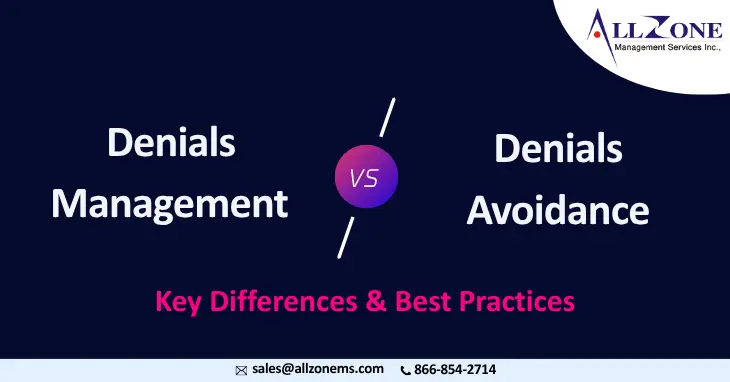In today’s healthcare landscape, denied insurance claims can seriously impact a provider’s financial health and operational efficiency. To address this, denial management services and denial avoidance programs have emerged as industry essentials. This post explores the differences between these two strategies, compares their respective best practices, and highlights why working with a leading denial management company such as Allzone MS can strengthen your revenue cycle management.
Understanding Denial Management
Denial management services focus on identifying, analyzing, and resolving insurance claim denials. A robust denial management company systematically reviews denied claims, determines root causes, and implements corrective actions to both recover revenue and prevent similar denials from occurring in the future. Key steps in the denial management process include:
- Identifying denied claims: Tracking claims rejected due to clerical issues, insufficient documentation, coding errors, or lack of payer authorization.
- Categorizing and analyzing denials: Classifying denials by type—such as eligibility issues, medical necessity, or out-of-date patient data—and uncovering trends that reveal systemic problems.
- Resubmission and appeals: Correcting and resubmitting claims or pursuing formal appeals as needed.
- Data-driven improvements: Using detailed analytics and feedback to improve claims accuracy and reduce future denials.
Benefits of Denial Management Services
- Higher claim approval rates: Enhanced processes and expertise lead to more successful claims and appeals.
- Reduced administrative costs: Outsourcing denials management cuts overhead for providers, allowing staff to focus on patient care.
- Faster payments: Improved claim quality leads to quicker reimbursements.
- Detailed reporting: Data analytics help identify patterns, informing process improvements and revenue optimization.
What Is Denial Avoidance?
While denial management addresses claims after a denial occurs, denial avoidance is proactive. The aim is to prevent denials from happening in the first place by ensuring all necessary steps are completed correctly during the claims process.
Key Elements of Denial Avoidance
- Front-end process improvements: Double-checking patient eligibility, proper documentation, accurate coding, and timely claim submissions.
- Staff training: Regular education on payer requirements, coding updates, and new technology use.
- Claims scrubbing: Leveraging technology and best practices to validate claims before they’re sent to payers.
- Feedback integration: Using data from previous denials to identify and correct root causes, creating a feedback loop that constantly improves future claims accuracy.
Benefits of Denial Avoidance
- Reduced denials: Prevention leads to fewer claim rejections and less rework.
- Increased revenue: A higher clean claim rate translates directly into steadier cash flow.
- Operational efficiency: Less time spent fixing denials means more time for patient care and other priorities.
Denial Management vs. Denial Avoidance: Key Differences
| Aspect | Denial Management | Denial Avoidance | |
| Focus | Reactive — addresses claims that have been denied | Proactive — prevents denials before they happen |
|
| Core Activities | Claims analysis, appeals, resubmissions, trend analysis | Staff training, claims scrubbing, documentation | |
| Timing | After claim denial occurs | Before claim is submitted | |
| Goal | Recover lost revenue, improve future claim success | Boost clean claim rate, minimize denials | |
| Tools | Analytics, denial databases, robust tracking | Training, eligibility checks, claims auditing |
While different, these strategies are highly complementary. Healthcare organizations benefit most from integrating both approaches—a well-developed feedback loop between denial resolution and process improvement is crucial for long-term revenue cycle health.
Best Practices for Effective Denials Management and Avoidance
- Analyze and Categorize Every Denial
Systematically gather data on denied claims, segmenting them by reason, payer, and process point. This root-cause analysis uncovers recurring problems and informs both corrective action and preventive training.
- Invest in Staff Training and Education
Keep your staff current with the latest payer policies, coding updates, and documentation requirements. Continuous education is vital for both pre-submission accuracy and effective appeals.
- Leverage Technology and Automation
Modern denial management services are empowered by analytics platforms, claims scrubbing software, and automated appeals tools, enabling faster claim resolution and prevention.
- Create a Denials Steering Committee
Many successful organizations assemble teams that include clinical, coding, and administrative experts to oversee denial management and avoidance strategies. This ensures both reactive and proactive tasks are addressed.
- Measure and Report Success
Key performance indicators, such as denial rates, average resolution time, and clean claim percentage, should be tracked and reported regularly for ongoing process improvement.
Why Choose Allzone MS as Your Denial Management Partner?
Allzone MS is a leading denial management company specializing in medical billing, coding, and end-to-end revenue cycle management. Established in 2005 and based in California—with additional delivery centers in India—Allzone MS boasts:
- Over 500 skilled professionals with expertise in 60+ medical specialties.
- A strong track record of delivering cost-effective denial management services and revenue recovery.
- Experience working with all major billing software and payer requirements.
- A commitment to high-quality deliverables and rapid turnaround times for claims processing.
By partnering with Allzone MS, healthcare providers can scale their denial management and avoidance strategies, minimize administrative burdens, and maximize reimbursements.
Integrating Denials Management and Denials Avoidance for Maximum Success
The healthiest revenue cycles result from organizations that understand the synergy between denial management and denial avoidance:
- Denial management ensures that every denied claim is properly investigated, appealed, and used as a data point for process improvement.
- Denial avoidance implements the lessons from denial management, making front-end improvements to keep future denial rates low.
When these programs work together, organizations experience fewer denials, improved cash flow, and greater operational efficiency.
Conclusion
Denial management services and denial avoidance initiatives are both crucial for the modern healthcare revenue cycle. While denial management addresses existing issues, denial avoidance targets the root causes to prevent problems. By combining both approaches—and partnering with an expert denial management company like Allzone MS—providers can achieve industry-leading reimbursement rates, reduce administrative hassle, and focus on delivering outstanding patient care.

